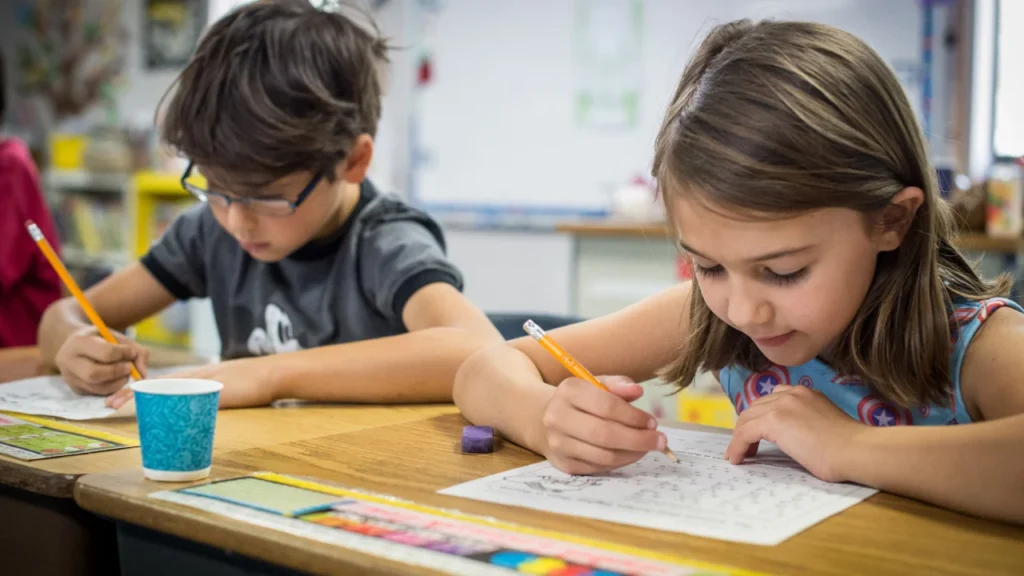![Discover How Murfreesboro Day School’s Innovative Curriculum Sparks a Love for Learning Introduction: A New Approach to Early Education In the heart of Tennessee lies an educational institution that’s reimagining how children learn. Murfreesboro Day School has emerged as a beacon of […]](https://dayschools.org/mca/wp-content/uploads/2024/09/day-school-11.webp)
Table of Contents
Introduction: A New Approach to Early Education
In the heart of Tennessee lies an educational institution that’s reimagining how children learn. Murfreesboro Day School has emerged as a beacon of pedagogical innovation, crafting an environment where education transcends traditional boundaries and ignites genuine enthusiasm for knowledge acquisition. The conventional classroom—with its rigid schedules, standardized approaches, and emphasis on rote memorization—has been thoroughly reconceptualized.
Walking through the corridors of Murfreesboro Day School reveals an atmosphere of dynamic engagement. Students converse animatedly about their projects. Teachers function as facilitators rather than lecturers. The classroom walls themselves serve as canvases for intellectual exploration, adorned with evidence of interdisciplinary learning. This institution has cultivated an educational ecosystem where curiosity thrives naturally.
What distinguishes this curriculum isn’t merely its departure from conventional methodologies, but its profound understanding of how children genuinely learn. The school’s approach is predicated on decades of cognitive research, demonstrating that deep learning occurs when students are intellectually and emotionally invested in their educational journey. Through deliberate design choices, Murfreesboro Day School has created a framework where learning becomes not just an academic exercise but a joyful discovery process that children eagerly anticipate each day.
The Philosophy Behind Murfreesboro Day School’s Curriculum
The pedagogical foundation of Murfreesboro Day School draws inspiration from multiple educational philosophies, synthesized into a cohesive approach that honors children’s innate capabilities. At its core lies the Reggio Emilia principle that views children as inherently competent, curious beings with rights rather than simply needs. This perspective permeates every curricular decision, ensuring that students are respected as active participants in their educational journey.
Constructivist theory heavily influences the school’s methodological framework. Children at Murfreesboro don’t merely absorb information passively; they actively construct knowledge through meaningful experiences. The curriculum acknowledges that learning isn’t linear but occurs through connections, relationships, and contextual understanding. Teachers orchestrate environments rich with opportunities for exploration, where students can test hypotheses and develop conceptual frameworks organically.
Perhaps most distinctive is the school’s commitment to the concept of “joyful learning.” This isn’t superficial entertainment but rather an educational approach recognizing that cognitive development accelerates when accompanied by emotional engagement. Administrators and faculty meticulously design experiences that challenge students intellectually while nurturing their intrinsic motivation. The result is a learning environment where education isn’t something done to children but something they enthusiastically pursue themselves.

Project-Based Learning: Education Through Exploration
Project-based learning stands as the cornerstone of Murfreesboro Day School’s instructional methodology. This approach transcends traditional subject-matter boundaries, instead organizing learning around complex questions or challenges that demand multifaceted thinking. A typical project might begin with an intriguing question: “How can we design a playground that’s accessible to everyone?” This seemingly straightforward inquiry subsequently unfolds into investigations of physics, mathematics, social justice, and communication.
Students proceed through carefully structured phases during project work. The initial exploration phase encourages broad questioning and knowledge activation. Research and planning follow, requiring students to gather information from diverse sources while developing organizational strategies. The creation phase transforms abstract concepts into tangible manifestations—whether architectural models, scientific experiments, or persuasive presentations. Throughout this process, reflection serves as a continuous thread, prompting students to evaluate their approaches and refine their understanding.
The efficacy of this methodology becomes apparent in practical implementation. Consider a recent third-grade project examining local watershed ecology. Students began by documenting observations at a nearby stream, progressed to researching water quality indicators, collaborated with local environmental scientists, designed water filtration systems, created informational materials for the community, and ultimately presented their findings to the city council. This multidimensional experience transformed abstract ecological concepts into meaningful knowledge while simultaneously developing research skills, scientific literacy, and civic engagement.
STEAM Integration: Where Science Meets Creativity
Murfreesboro Day School has transcended the traditional STEM paradigm by incorporating the arts into a comprehensive STEAM approach. This integration acknowledges that innovation flourishes at the intersection of analytical and creative thinking. Science, technology, engineering, and mathematics remain foundational, but artistic expression serves as both a medium for exploration and a pathway to deeper conceptual understanding.
The curriculum deliberately fosters transdisciplinary thinking through carefully designed learning modules. A unit on sound, for example, might simultaneously investigate the physics of wave propagation, technological applications in recording equipment, engineering challenges in instrument design, mathematical patterns in musical composition, and artistic expression through original sound creation. Students experience these disciplines not as isolated subjects but as complementary lenses for examining phenomena.
Specialized learning spaces facilitate this integrated approach. The school’s Innovation Lab combines traditional scientific equipment with digital fabrication tools and artistic materials. Here, students might transition seamlessly from conducting a scientific investigation to designing a physical prototype to creating an artistic representation of their findings. This environment nurtures cognitive flexibility—the ability to shift between analytical and creative modes of thinking—which research increasingly identifies as crucial for solving complex problems in our rapidly evolving world.
Personalized Learning Pathways: Meeting Each Child Where They Are
Recognizing the inherent diversity in learning profiles, Murfreesboro Day School has implemented a sophisticated system of personalized learning pathways. This approach rejects the one-size-fits-all model in favor of educational experiences calibrated to individual students’ readiness levels, interests, and learning preferences. The objective isn’t merely differentiation but genuine personalization that acknowledges each child’s unique developmental trajectory.
The personalization process begins with comprehensive assessment. Rather than relying exclusively on standardized measures, teachers employ multiple assessment modalities—observation, performance tasks, self-reflection, and diagnostic tools—to develop nuanced profiles of each student’s strengths, challenges, and potentialities. This information informs the creation of individualized learning plans that establish appropriate challenges while providing necessary support structures.
Technology plays a pivotal role in implementing these personalized pathways. The school utilizes adaptive learning platforms that adjust content difficulty based on student performance, providing additional practice or accelerating advancement as appropriate. However, personalization extends beyond digital tools. Flexible grouping strategies allow students to collaborate with peers at similar readiness levels for certain activities while engaging in mixed-ability groups for others. Learning centers throughout classrooms offer differentiated activities addressing various learning modalities. Perhaps most importantly, conferencing systems ensure that teachers regularly meet with individual students to review progress, set goals, and make adjustments to their learning journey.

The Role of Technology in Modern Education
At Murfreesboro Day School, technology integration transcends superficial applications to transform educational possibilities fundamentally. The school has cultivated a thoughtful approach where digital tools serve learning objectives rather than dictating them. This philosophy manifests in a carefully curated technological ecosystem that enhances rather than supplants human connection and hands-on exploration.
Digital resources are strategically deployed to expand learning beyond classroom walls. Virtual field trips transport students to inaccessible locations—exploring coral reefs, walking through ancient historical sites, or observing distant ecosystems in real-time. Collaborative platforms connect students with peers and experts globally, facilitating cross-cultural dialogue and authentic audience engagement. Simulation tools allow experimentation with phenomena too dangerous, expensive, or complex to experience directly.
The school’s approach to computational thinking particularly distinguishes its curriculum. Beginning in kindergarten, students engage with age-appropriate programming environments that develop algorithmic thinking. These experiences progress in sophistication throughout grade levels, ultimately enabling students to create applications addressing genuine needs. A recent sixth-grade project exemplifies this progression: students identified accessibility challenges within their community, designed and coded interactive maps highlighting barrier-free routes, and developed mobile applications providing real-time accessibility information. This project simultaneously developed technical proficiency, spatial reasoning, empathetic understanding, and problem-solving capabilities.
Developing Critical Thinking Through Inquiry-Based Methods
Inquiry-based learning permeates Murfreesboro Day School’s pedagogical approach, fostering sophisticated critical thinking capacities. Rather than presenting information as fixed and authoritative, the curriculum positions knowledge as dynamic and discoverable through structured investigation. Students regularly engage with provocative questions that resist simplistic answers: “What makes a community healthy?” “How do stories shape our understanding of the world?” “What constitutes ethical scientific research?”
The inquiry process follows deliberate phases designed to develop disciplined thinking. Initial engagement activities create cognitive dissonance, challenging preconceptions and generating authentic curiosity. Guided exploration follows, with teachers strategically providing resources and posing follow-up questions that direct investigation while preserving student agency. As understanding develops, students engage in evidence evaluation—distinguishing between reliable and unreliable sources, identifying logical fallacies, and recognizing confirmation bias in their own thinking. This methodical approach cultivates not just knowledge acquisition but metacognitive awareness.
Visible thinking routines provide scaffolding for developing these cognitive habits. Protocols like “Claim-Support-Question” require students to articulate assertions, provide supporting evidence, and identify remaining uncertainties. “See-Think-Wonder” guides observational skills development through increasingly sophisticated noticing. These structured routines initially function as external frameworks but gradually become internalized, transforming how students approach intellectual challenges both within and beyond academic contexts.
Social-Emotional Learning: Building Tomorrow’s Leaders
Murfreesboro Day School recognizes that cognitive development cannot be meaningfully separated from social-emotional growth. Consequently, the curriculum incorporates deliberate attention to interpersonal skills, emotional intelligence, and ethical reasoning. These elements aren’t relegated to isolated character education lessons but are woven throughout academic instruction and community experiences.
The school’s approach to conflict resolution exemplifies this integration. Rather than imposing adult-determined solutions, students learn structured protocols for addressing interpersonal challenges. Dedicated peace corners in each classroom provide physical spaces for reflection and dialogue. Students develop vocabularies for articulating emotions with precision and practice perspective-taking through structured activities. These skills receive reinforcement across contexts—during collaborative projects, on the playground, and in community meetings.
Leadership development comprises another vital dimension of social-emotional learning. Through the school’s progressive leadership model, students assume increasing responsibility for classroom and school operations as they advance through grade levels. Younger students might manage specific classroom tasks, while older students facilitate community meetings, mentor younger peers, and design service initiatives. These authentic leadership opportunities develop executive functioning skills while fostering genuine investment in the school community. The curriculum intentionally balances individual achievement with collective responsibility, preparing students for citizenship in an interconnected world.

Community Partnerships That Enhance Learning Experiences
Murfreesboro Day School has systematically dismantled traditional boundaries between school and community, establishing partnerships that transform learning from an isolated institutional activity into a community-embedded experience. These collaborations extend educational possibilities while demonstrating the relevance of academic learning to authentic contexts.
Local businesses provide real-world applications for classroom concepts. A partnership with an engineering firm enables students to shadow professionals and receive feedback on their design projects. A local farm serves as a living laboratory for scientific observation, mathematical modeling, and economic analysis. These connections help students visualize potential career pathways while understanding how academic disciplines function beyond classroom walls.
Cultural institutions significantly enrich the curriculum through sustained relationships. The school’s collaboration with a nearby history museum has evolved beyond occasional field trips into a comprehensive program where curators co-design historical investigations with teachers, students contribute to exhibition development, and the museum provides specialized resources for classroom use. Similar partnerships with scientific organizations, performing arts venues, and community service agencies create an extended campus that encompasses the broader community’s educational assets.
Perhaps most distinctive is the school’s intergenerational learning program. A partnership with a senior living community brings older adults into classrooms as mentors, oral history sources, and project collaborators. Students simultaneously benefit from their elders’ expertise while providing technological assistance and social connection. This reciprocal relationship transcends superficial community service to create genuine intergenerational learning communities.
Parent Involvement: A Crucial Component of Educational Success
Murfreesboro Day School conceptualizes parents not as passive recipients of educational services but as essential partners in the learning ecosystem. This partnership begins with transparent communication about educational philosophy. Rather than simply implementing innovative approaches, the school invests significantly in parent education—offering workshops, providing research summaries, and creating opportunities for classroom observation. This cognitive alignment ensures that educational approaches receive reinforcement across home and school environments.
Documentation plays a pivotal role in facilitating meaningful parent participation. Digital portfolios capture not just final products but the learning process itself—showing conceptual development, revision cycles, and student reflections. This documentation transforms parent-teacher conferences from cursory progress reports into substantive discussions about learning patterns, developing interests, and appropriate challenges. Parents gain visibility into their child’s educational experience while teachers benefit from parents’ unique insights about their children.
The school has established multiple pathways for parent involvement that accommodate diverse scheduling constraints and comfort levels. Some parents contribute directly to classroom learning by sharing professional expertise, cultural traditions, or personal interests. Others support curriculum development through resource gathering or material preparation. The Parent Advisory Council provides structured input on programmatic decisions, ensuring that family perspectives inform institutional planning. This multifaceted approach recognizes that meaningful partnership manifests differently across families while maintaining the principle that parental engagement significantly enhances educational outcomes.
Measuring Success Beyond Standardized Testing
Murfreesboro Day School has pioneered assessment methodologies that capture the multidimensional nature of genuine learning. While not dismissing the value of standardized measures entirely, the school’s comprehensive assessment framework encompasses a broader spectrum of competencies and utilizes diverse evidence sources to evaluate student development holistically.
Performance assessments constitute a central evaluation component. Students regularly demonstrate knowledge application through authentic tasks—designing solutions to real-world problems, creating original research, or developing multimedia presentations. These performances are evaluated using detailed rubrics that articulate expectations across multiple dimensions. Such assessments reveal not just content mastery but process skills like research methodology, revision capacity, and presentational effectiveness that standardized tests cannot adequately measure.
The school’s longitudinal portfolio system captures developmental progressions across academic years. Unlike point-in-time tests, these curated collections document growth trajectories, showing how concepts and skills develop over extended periods. Students actively participate in this documentation process, selecting representative work samples and reflecting on their significance. This metacognitive dimension transforms assessment from an external judgment into a self-awareness tool that nurtures students’ capacities to evaluate their own learning.
Qualitative data complements quantitative measures throughout the assessment system. Narrative reports provide nuanced descriptions of student approaches to learning, identifying patterns in problem-solving strategies, collaboration tendencies, and intellectual dispositions. These detailed observations offer insights into cognitive and social-emotional development that numerical scores alone cannot convey, providing a comprehensive picture of each student’s educational journey.
The Future of Education at Murfreesboro Day School
As Murfreesboro Day School continues its educational evolution, several emerging initiatives promise to further enhance its innovative curriculum. The school has recently established a research partnership with a prominent university’s education department, creating a laboratory setting where pedagogical approaches undergo systematic investigation. This collaboration ensures that curricular decisions remain grounded in empirical evidence while providing opportunities to contribute to broader educational research.
Environmental sustainability represents another developing curricular dimension. The school is transitioning toward a place-based approach that utilizes the local ecosystem as an integrated learning context. A recently developed campus permaculture garden provides a living laboratory where scientific concepts, mathematical applications, historical contexts, and ethical considerations converge around environmental stewardship. This initiative exemplifies the school’s commitment to education that transcends academic compartmentalization to address complex contemporary challenges.
Perhaps most ambitious is the school’s developing global competency framework. Recognizing that today’s students will navigate an increasingly interconnected world, the curriculum is expanding to incorporate cross-cultural understanding, global systems thinking, and multilingual communication. Virtual exchange programs with partner schools internationally provide authentic opportunities for perspective-taking and collaborative problem-solving across geographical boundaries. These experiences prepare students for citizenship in a global community while developing the adaptive capacities essential for navigating rapid societal transformation.
Murfreesboro Day School’s ongoing curricular evolution reflects its fundamental commitment to educational practices that honor children’s capabilities while preparing them for a complex future. By continually refining its approach based on emerging research, student outcomes, and societal needs, the school maintains its position at the forefront of educational innovation—creating an environment where learning remains not just effective but genuinely transformative.







Leave a Reply